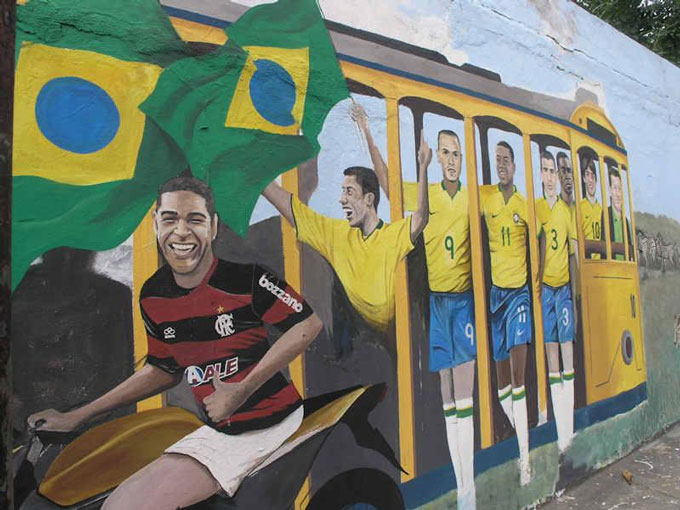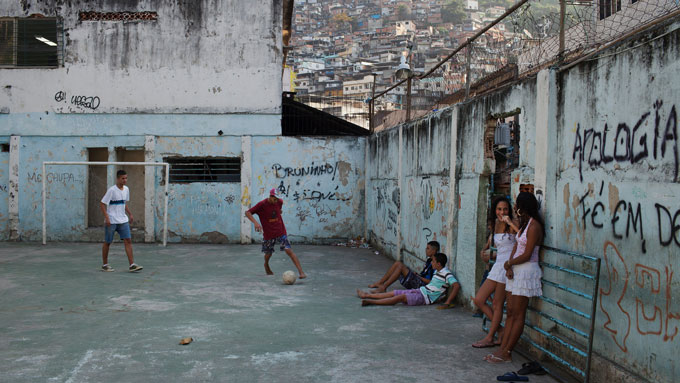Brazil has long been known as a "factory" that produces football talents who go on to achieve success worldwide. Brazilian players are highly sought after in football clubs across the globe. But why is the land of samba able to achieve this?
Brazilian Culture is Football Culture: Football arrived in Brazil over a century ago, quite literally in a suitcase, brought from Europe to entertain the settlers. It quickly became a captivating game and a cultural heritage as Brazilians began to embrace the sport, infusing their own distinct values into the beautiful game.
Aldo Rebelo, former Minister of Sports in Brazil, shared notable insights into the football culture of Brazilians. He stated, "Our people are very passionate about football, and Brazilian football is the passion of millions around the world. All you need is a ball and a field to play anywhere in this vast country, from the beaches of Rio de Janeiro to the jungles of the Amazon."
"What is unique about Brazilian football is that there is no predetermined mold. You won't find a player identical to Neymar, Pelé, Ronaldo, or Romário. Each one has their own distinctive traits that cannot be replicated. We encourage young players to be themselves with their own characteristics."

When asked about Brazil's football philosophy, Rebelo analyzed, "The philosophy of the Brazilian school of football, if we can call it that, is happiness, spontaneity, and freedom within a certain order (tactics). Our 'football player factory' uses the dreams of millions of children as raw material, children who hope to one day be on par with their heroes, regardless of fame or social advancement. As former Brazil coach Luiz Felipe Scolari once said, Brazilians always crave football."
Rebelo also shared about the history of Brazil's football culture, stating, "The elite and intellectuals used to have some reservations about football. That's why we don't have any big books or movies about football in Brazil. The culture and passion for football come from the less privileged segments of society, the fans who save up some hard-earned money to go to the stadiums. Football was initially introduced and practiced in Brazil by the elite. People of African descent were only allowed to be hired by professional teams around 1920. But from the beginning, it became a passion for all social classes. The working-class took football from the elite and turned it into what it is today in Brazil."
Regarding the fact that many great Brazilian players come from slums or low-income areas, Rebelo explained, "In a society that, for many years, was formed by a hierarchical social structure, where one's skin color or the amount of money they had determined their position, football became a way for people of African descent and the poor to achieve social advancement. This explains why many football players come from slums or low-income areas. And although society is no longer unequal, this still happens today."

At present, many believe that the free creative prototype of Brazilian players is gradually diminishing. Rebelo stated, "One issue we face in Brazil is that players go to Europe at a very young age. As a result, they adapt to the football models in England, Germany, and Italy, which can be detrimental to the future of our football. Brazil has always stood out for having excellent attacking players and midfielders. This has changed a few years ago when Brazilian defenders like Thiago Silva and David Luiz emerged. But then we had Neymar, who brought back the love for our skillful style of play."
Brazilian Football is Street Football: Brazil is globally recognized for its love for football. From Pelé to Neymar, Brazil has produced players with their own unique style and exceptionally sophisticated teams. It has become the most respected football nation in the world.
Notably, São Paulo, Brazil's largest city, is the pulsating heart of "O Jogo Bonito" (The Beautiful Game), the most popular sport in this South American country.
The city is home to around 12 million people and has a rich history of success stories in football. The city's three major clubs – Corinthians, Palmeiras, and São Paulo – have collectively won 27 national championships and boast a total of 7 million fans.
The passion for football flows freely at all levels in São Paulo, from professional to semi-professional and amateur. It is estimated that there are over 1,000 amateur teams active in the city of São Paulo.
Inspired by national team heroes, many amateur football players create their own unique style, combining vibrant clothing, lively tattoos, and flashy boots, turning matches across the city into colorful and dynamic performances.
On a weekend stroll through São Paulo, one can witness people playing football in various settings, from a father teaching his child the basics in one of the city's parks to an amateur championship in a converted abandoned factory turned impromptu stadium. The city's life revolves around football.

The Brazilian Football Factory: Deasevedo, a youth football coach, explains, "For every 10 children in Brazil, there are 11 who want to become professional football players. They don't leave the hospital in regular clothes when they are born; they leave the hospital in the jerseys of football clubs. At least 30% of these children will play football at a high level. Most others will find a place somewhere in the world to play football."
In Brazil, football is ingrained in the people's blood. In the 84-year history of the FIFA World Cup, Brazil has won more titles than any other nation. And just like coffee and sugar, football talent has become an exportable commodity for Brazilians. Today, over 10,000 Brazilians are playing professionally worldwide.
An exemplary case is the Botafogo Football Academy. It is one of Rio de Janeiro's top football clubs, where children start playing daily from the age of 7 and can sign professional contracts as early as 9. In the multi-billion-dollar global football industry, these children are potential money-making machines.
Felipe Arantes, the director of Botafogo International, states, "At the age of 9, we tell them, 'You are different.' We teach them football and educate them. And we tell these kids that they need to focus their entire lives on football."
Botafogo hires many people – from social workers to psychologists to nutritionists – to address any personal, mental, or physical issues the players may face, ensuring they remain focused on the field. But even when a child is not exhausted after years of training, there are still many pressures, such as promises of seven-figure salaries on distant European fields.
It can be a dream for the whole family. Ivo Barbosa, a father who sees football as a ticket to a better life for his sons, says, "I had to start working at the age of 11, so I didn't have the opportunity to do what my sons are doing. But I can bring them dreams. I couldn't fulfill the dream of playing football, but my sons will be different."
But Barbosa also emphasizes to his sons that they need a backup plan and prohibits them from playing football if their school grades suffer. Other parents are less cautious, relying on their children's wages.
"Sometimes, you have 17-, 18-year-old players who are the heads of the family. They pay the bills for the whole household," says Arantes. "Instead of collecting titles or aiming for a long-term career, they end up seeking money because they need to help their parents, grandparents, siblings – everyone looks to football."
And while these children are thinking about their families, the agents are thinking about profits. In the first year of a contract, Arantes explains that agents will identify a talented player and provide them with boots and jerseys, while also starting to plan their development.
"Then they go to meet the parents and ask, 'What do you need? Do you need a house? Do you need a car?' And they start bribing the parents," Arantes says. "Parents and agents don't allow a child to have their own decision. There is a big gap between developing a player and the business side."
Unforeseen Danger: Deasevedo knows all too well the significance of becoming a promising young player in Brazil. He had the opportunity to become a star, but an injury ended his career. "That was my lifelong dream," he says. "I got injured just before turning professional. It's an issue with the knee ligaments, and in a poor family, there is no way to afford surgery."
After giving up his player career, Deasevedo turned to coaching and expresses regret about the current state of Brazilian football. "There is a big disappointment because most players are not ready to leave, but money is used to force them to leave. We lose players at a very young age. Are the players hungry? And they are forced to leave."

These young players are part of a legacy – carrying the dreams of an entire nation. Pele needs to appear next, with the entire industry trying to find him – even at the cost of Brazilian culture. The exportation of players to Europe, who then return with significant money and pragmatic football, has gradually eroded the essence of Brazilian football.
Deasevedo speaks about the returning players, "They are just here to entertain, and we don't see much quality. And that's not a good example for the players staying here. It endangers the quality of our football."
Unknown Players Shake Up the A-League Too: Marco Tulio was a relatively unknown player in Brazilian football. He was recruited by Sporting Lisbon in 2017 but often loaned out. In 2022, Tulio signed with the Central Coast Mariners in Australia's A-League and immediately made an impact there.



